
A lawyer for WikiLeaks founder Julian Assange said an "urgent political fix" is needed in his case because legal appeals against his extradition to the United States could continue for another decade and his health is declining.
Barrister Jennifer Robinson has been on Assange's legal team for 12 years, and during a visit to Australia said she hoped the new Australian government could provide a breakthrough, after its public statements that Australian-born Assange's case has "gone on long enough".
She also called for the new British prime minister - "whoever that ends up being" - to take a position on free speech and raise the case with the United States.Assange, 50, is wanted by U.S. authorities on 18 counts, including a spying charge, relating to WikiLeaks' release of vast troves of confidential U.S. military records and diplomatic cables, which Washington said had put lives in danger.
Of the mainstream Australian press gallery, only David Crowe of the Sydney Morning Herald turned up to listen to Jennifer Robinson, lawyer extraordinaire who has spent years representing WikiLeaks founder Julian Assange. Since 2019, that representation has taken an even more urgent note: to prevent Assange from being extradited to the United States, where he faces 18 charges, 17 confected from the archaic Espionage Act of 1917.
In addressing the Australian National Press Club, Robinson’s address, titled ‘Julian Assange, Free Speech and Democracy’, was a grand recapitulation of the political case against the WikiLeaks founder. Followers of this ever-darkening situation would not have found anything new. The shock, rather, was how ignorant many remain about the chapters in this scandalous episode of persecution.
Robinson’s address noted those blackening statements from media organisations and governments that Assange was paranoid and could leave the Ecuadorian embassy, his abode for seven years, at his own leisure. Many were subsequently ‘surprised when Julian was served with a U.S. extradition request’. But this was exactly what WikiLeaks had been warning about for some ten years.

On A cloudy Saturday morning in the middle of June 2012, Australian journalist Julian Assange walked into the Ecuadorian embassy in Knightsbridge, London.
He was a hunted man. Over the past two years, he had been revealing the secrets, in alliance with the world’s largest newspapers, of the so-called war on terror of the United States, an extraordinary explosion of violence which had been raging for more than a decade.
Britain’s Supreme Court had days before approved his extradition to Sweden to be questioned over sexual assault allegations, for which he was never charged. The case was dropped in 2019 after a review of the evidence.
This obscure embassy in London had barely garnered a single line in the news media in its history. But over the next seven years it would become a global story involving assassination plots, industrial levels of surveillance and finally the British police forcibly evicting Assange in April 2019.
When Assange walked into the embassy, the president of Ecuador was Rafael Correa, a US-trained economist who had assumed power five years before in 2007. He was a key figure in the ‘pink tide’ of left-wing governments that took office across Latin America in the 2000s and would serve for a decade.
Correa is now living in Brussels after himself being granted political asylum to avoid persecution by Ecuador, the state he once headed.
In an ironic twist of fate, Correa and Assange, who has been in maximum-security Belmarsh prison for three and a half years, now share a lawyer as they both battle extradition. We are meeting at the offices of this lawyer. A giant Free Assange sign greets visitors at the entrance.
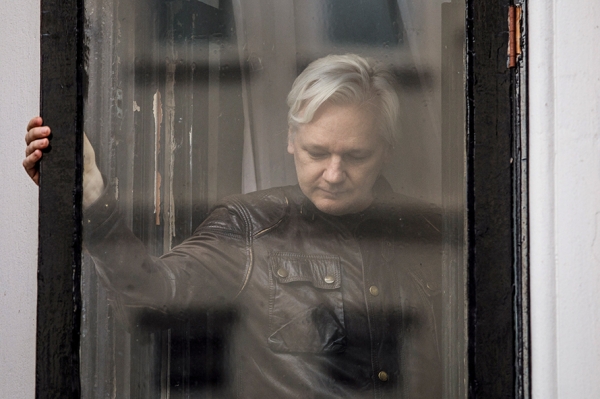
In a dark wood panelled room looking out onto the street, Correa tells me of that June day his foreign minister told him Assange had entered the embassy in London. ‘We started studying his case’, Correa says.
In August 2012 — ‘after two months of studying his dossier’ — Correa’s government granted Assange asylum to protect him from persecution by the US government for his journalistic activities.
‘There was not any possibility for him to have a fair process, that was not possible’, Correa says. ‘I refer to the United States, there was too much public pressure, government pressure, media pressure against him.’
Over the next five years, his government would enter protracted negotiations with the British authorities, who had enacted a secret campaign, codenamed Operation Pelican, to get Assange out of the embassy. Correa is withering about the UK’s attitude to these negotiations.
‘They are historically an imperial power so they believe sometimes they continue with this power’, he says of the British. ‘Anyway, against us that doesn’t work. And, yes, they were very rude. They wanted to impose their laws, their criteria. And we didn’t accept that.’
He continues: ‘We have, as a sovereign country, the right to grant asylum to anybody without giving any explanation. But we gave an explanation because we considered the British, the American government, the Swedish government, but we didn’t have to do that.’
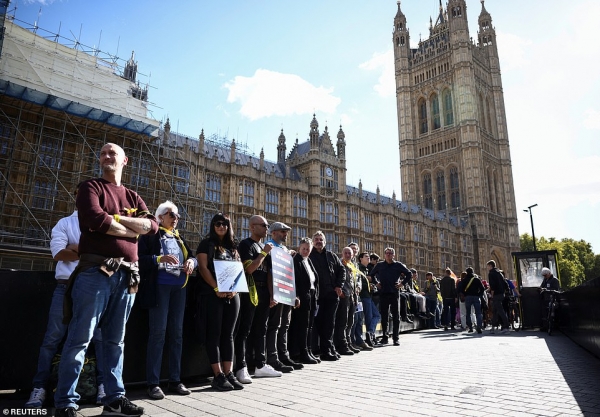
Correa says British pressure escalated soon after Assange entered the embassy.
‘There was a moment where the British authorities threatened us that they would enter our embassy’, Correa says. ‘But that was against international rights and absolutely illegal, but also silly… Why? Because they have many more embassies around the world than we do.’
He pauses. ‘So, if they gave to the world such a bad example, the worst consequences will be against them. Because later, without any pretext, any reason, anybody could enter, in any country, their embassies.’
Ironically, the British pressure was much more blunt than Correa was receiving from the Americans.
‘Frankly, I don’t remember the American government threatening us like the British government when they said that they can enter our embassy’, Correa says. ‘We didn’t receive from the American government, as long as I remember, any threat like this.’
With Assange granted asylum by a friendly country like Ecuador, he should have been allowed safe passage out of the United Kingdom.
‘Of course, the British are used to being obeyed, not to negotiate with a third-world country’, Correa says. ‘They tried to deal with us like a subordinate country.’

Correa tells me he has only ever spoken to Assange once, when he was interviewed by him for ‘The Julian Assange Show’, a short-lived interview series mostly done before he went into the embassy.
‘I don’t know Julian Assange’, Correa tells me. ‘I have never talked to him on the telephone or met him in person. You want my honest personal position? I don’t agree with all the things that Julian Assange did, but that is irrelevant.’
He adds: ‘The main point here is that he didn’t have any possibility of having a fair legal process in the United States. So absolutely we had a sovereign right to grant Julian Assange political asylum.’
But Correa is not optimistic about the end goal of the Americans and British now they have their hands on him. ‘They want to kill him’, he says.
‘They are destroying him. They already destroyed him. My lawyer, and we are having this interview in my lawyer’s office in Brussels, well, he’s also Julian Assange’s lawyer and he can tell you that he’s absolutely destroyed as a human being. So, they already destroyed Julian Assange.’
Correa continues:
‘What they want to do is make an example of Julian Assange: you can see what happened with someone who dared to reveal our secrets. But what secrets did Julian Assange reveal? War crimes. We have to thank him. Instead of that they are killing him.’
Will Assange ever be free again? I ask. ‘I am very pessimistic. I don’t think so. They want to make an example of Assange: you cannot pass these red lines, you cannot deal with us, you cannot reveal our crimes. That is the message.’

He continues:
‘I realise very well, I was president for 10 years, that countries must have confidential information. But there are limits. You cannot hide war crimes. And even more, you can find a double standard here. Why? Because strictly speaking, Julian Assange didn’t publish the information.
‘The information was published by The New York Times, by Der Spiegel in Germany, by El Pais in Spain, The Guardian in the UK. Why are they not being punished, being persecuted? Because they are the strongest part of the chain. They selected the weakest part of the chain: Julian Assange.’
‘Captured by the CIA’
WHEN Assange was in the Ecuadorian embassy it likely became the most surveilled premises in the world. In June, the British government admitted that Julian Assange’s long-time lawyer Jennifer Robinson was likely the subject of ‘covert surveillance which breached her human rights.’ Ecuadorian officials inevitably received the same treatment.
‘We knew that moment there — and we continue to know — that we were under surveillance’, Correa says. ‘Even more, we engaged a special security company in order to protect the embassy, to protect Julian Assange, it was called UC Global from Spain. And they betrayed us. They sold the information to the CIA. They were, if you want, captured by the CIA.’
It was later revealed that it was worse than surveillance. In September 2021, Yahoo News published a story based on the testimony of 30 ex-US officials showing the CIA had sketched plans to kidnap or kill Assange in London. Correa says he read the article. Did it shock him?
‘Of course, but it didn’t surprise me because we are used to that. This is Latin America’s history.’ He adds: ‘One thing is very clear: for the American government Julian Assange is an enemy” and they want to “destroy his freedoms, his reputation, and perhaps his life.’
It has been striking over recent years how Latin American leaders have led the fight for Assange’s freedom, from Cristina Kirchner in Argentina to Evo Morales in Bolivia. Mexican President Andrés Manuel López Obrador has even shown the infamous ‘Collateral Murder’ video in his presidential press conference, offered Assange asylum and handed US president Joe Biden a letter when they met pleading for Assange’s release.
![Stella Morris the wife of Julian Assange talks to the media outside Westminster Magistrates' Court in London, in April 2022. [Morning Star]](/news/photo/202210/131106_117975_2153.jpg)
Why is it this continent leading this press freedom case of world-historical importance?
‘I don’t have an answer for that’, Correa says. ‘I am surprised, shocked, because Julian Assange was betrayed by journalists around the world, by governments around the world, by his own government, the Australian government.’
He adds:
‘If we had an Ecuadorian citizen suffering these kinds of pressures, persecution, illegal situation, our duty is to defend him, but the Australian government doesn’t care.’
When Assange was granted asylum by Ecuador, much of the British press was looking for attack lines. One major one was that Correa was cracking down on press freedom in Ecuador.
The Financial Times, for example, wrote: ‘Assange was overlooking Correa’s worsening record when it comes to respecting freedom of the press.’
‘That is propaganda’, Correa tells me. ‘Can you give me an example of an attack against press freedom? But because we always looked for the truth, because we used to respond to the lies of some journalists, we are against press freedom… It’s because we are against lies, against manipulation.’
Correa’s administration was trying to break up the oligarchic control of the media, which is particularly pronounced in Latin America.
In fact, one example of the attack on press freedom cited by the FT was an anti-monopoly law which proposed shareholders and directors of media companies with more than 6 per cent stakes of national media companies should divest to other non-media interests.
‘You have to be absolutely aware that the instrument used to maintain the status quo in Latin America is the media’, Correa tells me. ‘You have to ask this question: to whom does this media belong? To the elites in order to continue wit’h the control of our countries. And they are going to be against any government trying to change the really hard, tough Latin American situation. For instance, we continue to be one of the most unequal regions in the world.’
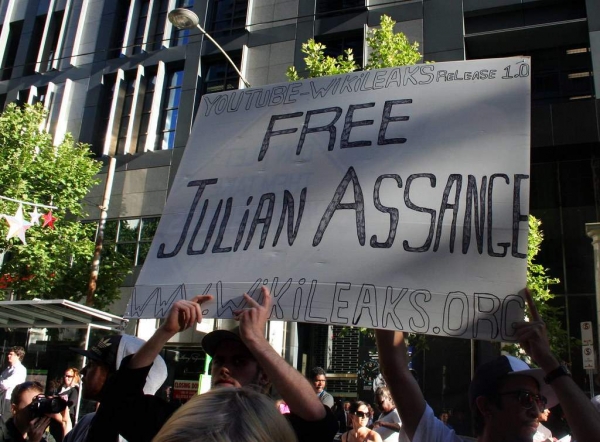
When Correa stepped down in 2017, the candidate nominated to fight the next election for his Alianza País party was Lenín Moreno. Moreno had been Correa’s vice president for six years, but after he won the 2017 election, he flipped.
Correa’s relatively moderate social democratic programme saw extreme poverty in Ecuador nearly halve, inequality fall dramatically and social spending as a percentage of GDP nearly double.
But Moreno began steadily undoing the progressive reforms of the Correa administration, reintegrating Ecuador into the Washington Consensus economic infrastructure — and getting close to the US.
A campaign of what has been termed ‘lawfare’ was launched against officials from the Correa administration. Many had to flee the country.
Moreno’s successor as vice president, Jorge Glas, was arrested and sentenced to six years in prison on bribery charges. He was released in April this year, but was rearrested the following month. Correa himself was targeted.
‘It’s a regional strategy, not just against me’, Correa says. ‘It’s against [former Brazilian president] Lula, against Evo Morales. Cristina Kirchner… So when you have this kind of real strategy, there is no coincidence. It’s a regional strategy and that can happen only if the American embassies in our countries are backing that.’
Correa believes his administration’s granting of asylum to Assange is partly to blame.
‘Of course, part of this political persecution that I have received is because of Julian Assange. Also, I cancelled the agreement to have an American base in our country in 2009. I stopped that. These are things that the American authorities do not forgive.’
In 2009, Correa refused to renew the lease for the US military base at the coastal city of Manta in western Ecuador. ‘We’ll renew the base on one condition: that they let us put a base in Miami — an Ecuadorian base’, he said. The Americans did not agree.
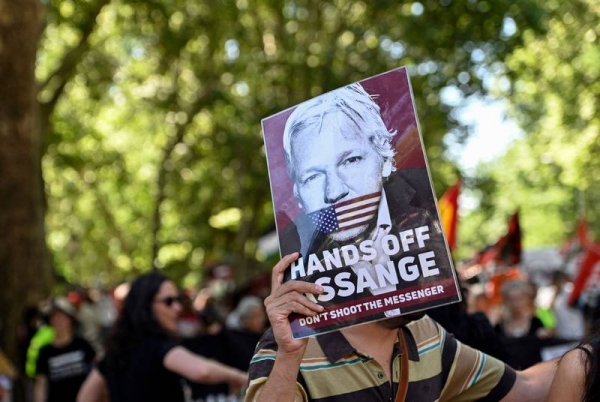
Any left-wing leader in Latin America knows that their biggest foe is the US, which has designated the Western Hemisphere as its area of influence since 1823. But during recent history, US methods of ridding the region of unwanted governments have diversified away from straight military coups like Guatemala in 1954 or Chile in 1973.
‘It’s very difficult to have, especially in South America, a military invasion from the United States, that is not possible’, Correa says. ‘But there are more fine, if you want, ways in order to destabilise a government that they don’t like. For instance, financing the opposition groups, for instance, NGOs, and they receive this money, the financing, from the National Endowment for Democracy that everybody knows is the financial branch of the CIA.’
BUT Correa says it’s not just the U.S. that wants him and his legacy destroyed. ‘There is also the media hate, the elite hate… to try to conserve, to maintain the status quo. We are a danger for the status quo. We are a danger for their privileges.’
In April 2020, an Ecuadorian court sentenced Correa to eight years in prison after finding him guilty on corruption charges. Correa was accused over a $6,000 payment to his private account, which he says was a loan.
‘Eight years prison for a payment of $6,000’, he says. ‘One of the proofs is that I received from a common fund that we had at the presidency. They said that they were bribes; $6,000 put in my personal account in a public bank. But they have nothing. It’s just a set up against us.’
The sentence came hours before he was going to register himself as a candidate in the 2021 presidential election.
‘In this way, they prevented me from returning to my country’, he says. ‘They prevented me from being a candidate and they made Lasso president.’
Guillermo Lasso, a rightwing banker who was embroiled in the Pandora Papers offshore tax leaks, narrowly won the 2021 election.
‘They are not just stealing our reputation, our stability, they are stealing our democracies’, Correa says. ‘But because all these attacks are against left-wing leaders, nobody cares.’
The same thing happened in Brazil when Lula [ former President Luiz Inácio Lula da Silva] was put in prison in 2018 on corruption charges, which were eventually shown to be politically motivated. He was in prison for the elections the same year.
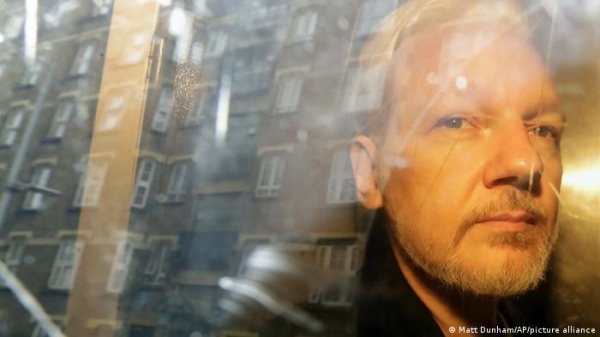
‘They prevented Lula from being a candidate and they made Bolsonaro, a fascist, president of Brazil’, Correa adds.
Up Until 2017, Moreno had been an ally and a key figure in the ‘Citizens’ Revolution’ that transformed Ecuador during Correa’s 10 years in charge. Why did he suddenly flip when he became president and try to destroy the whole movement he had been part of?
‘One of the strongest hypotheses is that Lenín Moreno is corrupted’, Correa tells me. ‘We realise very well now. We didn’t know that moment there, but now we know that he had a secret account in Panama. We have the number, we have everything.
‘So perhaps the American government knew that before us, and they put Moreno under control. Otherwise, it’s very difficult to understand what was the switch of Moreno from our political programme, progressive programme, to the far-right programme and to be absolutely subordinate to the United States.’
He continues: ‘One proof is that just one week after Lenín Moreno took office, he received Paul Manafort, the campaign chief of Donald Trump, and Moreno offered to Manafort to give Assange to the American government.
‘You have several testimonies of people who were in this meeting in Ecuador in the presidential palace one week after Lenín Moreno took office. So that moment there, he was negotiating with Julian Assange already.’
In April 2019, likely as part of this deal, Moreno rescinded Assange’s asylum and invited the British police into the Ecuadorian embassy to snatch the WikiLeaks founder. It was a watershed moment.
‘The country was humiliated’, Correa says.
‘Nobody else will trust Latin American countries in order to look for a political asylum. The damage is huge. It’s huge and lasting. And, even more, it is against our constitution. You can see the Article 41 of our Constitution. This article explicitly prohibits giving to the persecutors someone persecuted. So he [Moreno] broke our constitution.
‘But there is no problem as long as you are acting according to the United States government or according to the media, the elites, and against Correa, that is perhaps the most important point.’
It is clear that the pressure and stress of the extradition case and the turmoil in Ecuador has had a personal impact on Correa. He speaks quickly, rushing to express his defence against the constant attacks. He has a noticeable nervous energy, tapping his foot on the floor incessantly.
![WikiLeaks founder Julian Assange has been fighting extradition to the US for years. [DW]](/news/photo/202210/131106_117980_2417.jpg)
I ask Correa how he feels about it all.
‘For me it’s very hard’, he says. ‘It’s very sad, very disappointing, that it happened. We have to continue fighting in order to recover the country.’
Correa says that Britain had a particularly colonial way of dealing with his country.
‘We tried to have a good relationship with any country in the world but in a framework of mutual respect’, he tells me. ‘But it’s clear that the UK disrespects a country like Ecuador, it was not just the case of Julian Assange.’
Recently, Bolivia’s former president Evo Morales told Declassified that Britain still has a ‘totally colonial mindset.’ I ask Correa if he agrees. ‘Unfortunately, yes’, he replies and then gives another example.
‘In 2009, the British ambassador called me and told me that Prince Charles with Camilla will come to the country to visit our Galapagos Islands. We were very honoured to have Prince Charles and Camilla. But the British ambassador not just told me, but ordered me, to receive Prince Charles on Sunday. And I told him, “Come on, ambassador, Sunday is my family day. I work from Monday until Saturday and try to dedicate my Sundays to my family.”’
British ambassador Linda Cross insisted on Sunday. Correa then remonstrated ‘“but he’s coming for vacation so we can receive him on Monday, we have a very nice ceremony at the Presidential Palace every Monday, the changing of the Presidential Guard. It was a very beautiful ceremony. We can invite Prince Charles with Camilla. There are a lot of people in the central park in front of the presidential palace. He can say hello to them.”’
Ambassador Cross continued to insist it must be Sunday.
‘Finally, I sent my vice president to receive Prince Charles and Camilla, and I realised very well that they didn’t forgive me because next year I had to go to London. I was invited by the London School of Economics and other universities to give some speeches. And nobody received me as president of Ecuador at the airport in London.’
This treatment is indicative of a continent that does not exercise the British government, says Correa. ‘We are not important for the UK government.’
WikiLeaks=New Age
wiki@wikileaks-kr.org


